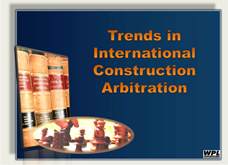Trends in International Construction Arbitration
Presented by:
James G. Zack
Executive Director
Navigant Construction Forum™
International arbitration is a transnational dispute typically involving disputes between parties from different nations often performing work in yet another nation. An example of an international arbitration would be if a U.K. contractor constructing an ore-processing facility in a sub-Saharan African nation on behalf of a Canadian minerals company, files a claim for UK£1.45 million and seeks arbitration when the project owner refuses to settle.
As the world’s economy has become more globalized, more corporations are working internationally. Over the past two to three decades disputes on construction projects have become larger, more complicated and more common.
Research indicates that arbitration is the preferred dispute-resolution mechanism for international corporations rather than transnational litigation. As the number of arbitration case filings has increased so has the number of arbitral institutions (which now number at least 28) and the seats of arbitration. Perhaps in reaction to growing criticism of the process, there has been and continues to be other changes concerning international arbitration.
Topics covered in this 90-minute program include current trends concerning international construction arbitration including:
- Corporate dispute resolution policies favor arbitration;
- Virtually all arbitral institutions report a growth in case filings year after year;
- In-house legal counsel do not use retained legal counsel but seek specialized counsel;
- In-house legal counsel are remarkably consistent on top influences for selecting arbitrators;
- In-house counsel are also consistent on their choice of governing law;
- Despite 28 arbitral institutions globally, 3 dominate the field;
- There are two favored seats of arbitration but some regional centers are gaining in popularity;
- International arbitration is no longer faster or cheaper than litigation;
- A high percentage of disputes are settled prior to issuance of an arbitral award;
- Very few participants have to appeal an award for judicial enforcement;
A majority of international corporations would grade and report on arbitrator performance; and
Confidentiality of arbitration remains one of the strongest selling points for arbitration.
This presentation will also point out some developing trends which have the potential to change the face of international arbitration including:
- A growth in appellate rights;
- A tendency to expand discovery rights;
- A trend toward informal or interim dispute resolution measures;
- A growing use of new methods to expedite proceedings;
Renunciation of international arbitration conventions by some nations; and
International arbitration is now a marketplace with specialists and some moves toward external regulation.
Who Will Benefit?
This program is a must if you're a public or private owner, construction manager, contractor, subcontractor, consultant, architect, engineer or attorney.
Meet Your Presenters:
 James G. Zack, CCM, CFCC, FAACE, FRICS, PMP
James G. Zack, CCM, CFCC, FAACE, FRICS, PMP
Executive Director
Navigant Construction Forum™
Jim is the Executive Director of the Navigant Construction Forum. The Forum strives to be the construction industry’s resource for thought leadership and best practices on avoidance and resolution of construction project disputes globally. Formerly he was the Executive Director, Corporate Claims Management, Fluor Corporation, one of the world’s largest publicly owned engineering, procurement, construction and maintenance (EPCM) contractors working in the areas of energy, chemicals, infrastructure, manufacturing, life sciences and mining. Mr. Zack was previously Vice President of PinnacleOne and the Executive Director of the PinnacleOne Institute and a Senior Construction Claims Consultant for CH2M HILL, Inc. Mr. Zack has, for nearly 40 years, worked on both private and public projects. In the construction claims field, he is a recognized and published expert in mitigation, analysis and resolution or defense of construction claims and disputes.


 James G. Zack, CCM, CFCC, FAACE, FRICS, PMP
James G. Zack, CCM, CFCC, FAACE, FRICS, PMP